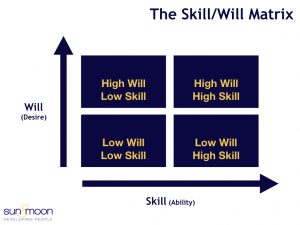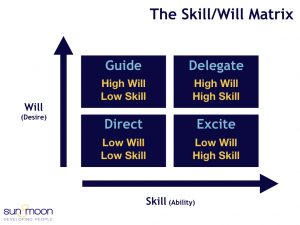In this series of three posts, I will take you through the three key elements of efficient and effective delegation.
The the key elements are:
- Selection: How to choose, when, and to whom you can delegate
- Levels: How much input you have on the task delegated
- Structure: A process for the handover conversation
This week we’ll look at:
Selection
Selecting the right task to delegate is key to effective delegation. Not every task is suitable for delegation. Let’s consider the criteria for successful selection. How critical is this to the long term? And so, what’s the risk if your delegation isn’t appropriate? If the task is not critical long-term, then consider delegating.
Is there a member of the team who is competent enough to do this task effectively? If so, delegate.
How time sensitive is the task? You need time to brief someone, and they may need training and support.
If the task is a one-off, it may be easier to just do it. If it’s a regular item, it becomes a good candidate for delegation. Investing time to delegating will end up saving you more in the long-term.
Benefits of Delegation
What are the benefits to you and others? Clearly, you get some time back in the long-run if you delegate effectively. Delegating responsibilities to team members can also be empowering, increase their motivation and commitment, particularly if it helps their personal development.
Look at the downside and decide if the risk is manageable. What happens if the task is not completed on time or badly? Is there time to make it good? Is an average performance good enough?
Now, you’ve decided on a task to delegate; who will you choose? Ideally, someone with the competence or skill to do the task, and the attitude, or will, to do it in a timely efficient way. The individuals in your team will have a unique combination of these two factors. Knowing your delegatee is essential, as it will determine what and how you delegate, as well as how you manage the task.
The Skill-Will Matrix analyses, one: how competent, the level of skill; two: how motivated, the level of will. Each box suggests a different approach and level of delegation.

A High Skill-High Will person needs no motivation, and probably no help to complete a task. In fact, they do better being left to do it.
Someone on the other end of the spectrum, who is not very competent and not motivated will require more supervision and more directive management.
The Motivation for Efficient and Effective Delegation
Guide
Low Skill-High Will could be a conscientious new team member, a graduate, or someone who habitually over stretches and overestimates their ability. To delegate to this type of person, you need to guide. Understand their training requirements, the gaps in their skill, create a risk-free environment to allow early mistakes and learning, monitor progress regularly, and ensure feedback and praise to retain the high will.
Delegate
Your High Skill-High Will team member is very likely to be one of your high performers, so don’t get in their way. Provide freedom to do the job, encourage them to take responsibility and initiative, take appropriate risks, don’t over-manage them, as this will impact on their will.
Direct
Low Skill-Low Will may be someone who is being passed over for promotion, a disgruntled low performer, a bad hire; faced with this task you should build their will. You need to find the reasons for their low will to motivate them. Give clear and concise briefings, structure tasks for quick wins, give frequent feedback against progress, encouragement to build their will. Manage them with close supervision, clear rules and deadlines to protect against the lack of skill. You should only choose low risk tasks in this box.
Excite
The High Skill-Low Will team member has lost the appetite for the job. It may be they are close to retirement or moving on, it could also be someone with very low confidence and a high fear or failure. Or a person who is overqualified for their position. Start by identifying the underlying reasons for low will. Motivate appropriately, if you can, monitor and give feedback, ensure scope for regular progress checks.
Start your journey to being an effective delegator – using this Skill/Will Matrix tool to think about how to choose, when, and to whom you can delegate.
Next post (in two weeks): Levels: How much input you have on the task delegated.

David Solomon
Managing Director, Sun and Moon Training
@SunMoonDavid
Photo copyright: jirsak / 123RF Stock Photo

